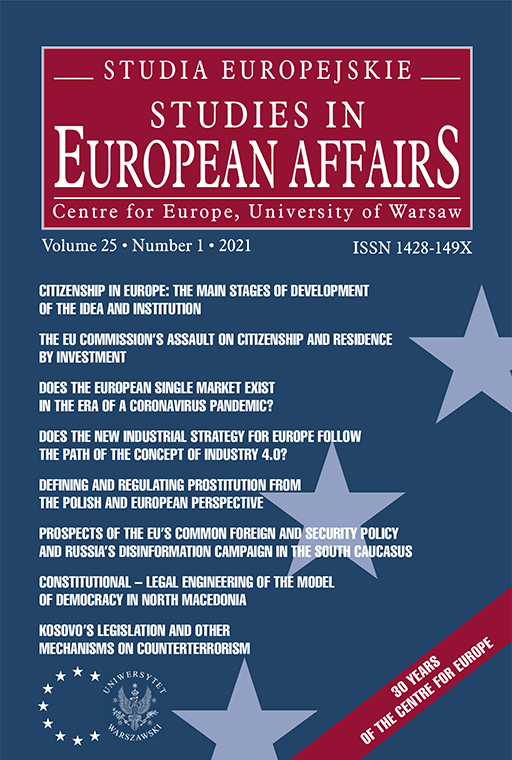
ISSUE: 1/2021
- Volume 25
- Number 1
- 2021
Subscribe NEWSLETTER
Studia Europejskie –
Studies in European Affairs
ISSN: 1428-149X
e-ISSN: 2719-3780
License
Articles published in the journal are under a Creative Commons Attribution – Non Commercial – No Derivatives 4.0 International License
Constitutional – Legal Engineering of the Model of Democracy in North Macedonia
Abstract
This thesis is a critical analysis of the constitutional and legal order of the Republic of North Macedonia, following the chronological process dating from the gaining of the county’s independence, through the armed conflict in 2001 that brought constitutional changes, to today. The first decade after the breakup of Yugoslavia was crucial for the North Macedonian state and its citizens. The writing/creation of the constitution of the new, independent state was not an easy process and it did not pass peacefully nor did it pass without any problems. The complex social process and relations have initiated the need for amendments to the Constitution, which, since its adoption in 1991 until today, has been changed 32 times in order to adapt to new, emerging situations and to give constitutional and legal responses to the inherent challenges. Of course, proper changes also occurred in the political system itself as a result of numerous factors, which have more or less influenced its character and shape.
References
Ambarkov N., The Republic of Macedonia, Consociational (consensual) enough?, “Iustinianus Primus Law Review”, vol. 5:1/2017.
Berglund S., et al., The Handbook of Political Change in Eastern Europe, Edwar Elgar Pub., Cheltenham 2013, DOI: https://doi. org/10.4337/9781782545880.
Bieber F., Partial Implementation, Partial Success: The Case of Macedonia, 2005, in: Power Sharing: New Challenges For Divided Societies, eds. D. Russell, I. O’Flynn, Pluto Press, London 2005.
Chokrevski T., Redefi nition of the Function of Law in Transition Countries: The Case of the Republic of Macedonia, “Balkan Forum”, no. 2/1996.
Dahl R., Dilemmas of Pluralist Democracy, Yale University Press, New Haven 1982.
Dahl R., On Democracy, Yale University Press, London 1998.
Division of power and implementation of the Ohrid Framework Agreement, Friedrich Ebert Foundation, Skopje 2008.
Handbook for parliamentary elections in the Republic of Macedonia, Konrad Adenauer Stiftung, Institute for Democracy, Skopje 2014.
Holliday H., From Ethnic Privileging to Power-Sharing: Ethnic Dominance and Democracy in Macedonia, in: The Fate of Ethnic Democracy in Post-Communist Europe, eds. S. Smooha, P. Järve, LGI-ECMI, Budapest 2005.
Jovicic M., Parliamentary System vs. Presidential and Parliamentary System, Archive for Legal and Social Sciences, Belgrade 1992.
Klimovski S., Desoska R., Karakamisheva T., Constitutional Law, Skopje 2009.
Klimovski S., Karakamisheva T., Desoska R., Political System, Skopje 2010.
Koneska C., Vetoes, Ethnic Bidding, Decentralization: Post-Conflict Education in Macedonia, “Journal on Ethnopolitics and Minority Issues in Europe”, vol. 11, no. 4/2012.
Levitsky S., Way L., Competitive Authoritarianism Hybrid Regimes after the Cold War, Cambridge University Press, Harvard 2010, DOI: https://doi.org/10.1017/CBO9780511781353.
Maleska M., Multiethnic democracy in Macedonia: political analysis and emerging scenarios, “New Balkan Politics”, issue 13/2013.
Markovic N., Popovic M., Political Dialogue, Konrad Adenauer Stiftung, Institute for Democracy, Skopje 2015.
Mojanoski C., Chronicle of the Macedonian Democracy, Skopje 2009.
Ripiloski S., Pendarovski S., Macedonia and the Ohrid Framework Agreement: Framed Past, Elusive Future, “Perceptions”, Summer 2013, vol. XVIII, no. 2.
Schendelen M.P., Consociational C. M., Democracy: The Views of Arend Lijphart and Collected Criticisms, “The Political Science Reviewer”, no. 15/1985, https://politicalsciencereviewer.wisc.edu/index.php/psr/article/view/21.Siljanovska Davkova G., Contemporary “models” of the organization of power: dilemmas and challenges, UDK 342.25/28, Original scientific paper, 2010.
Siljanovska-Davkova G., The Particularity of Democratic Transition of New States in the Western Balkans: The Case of Former Yugoslav Republics, in: Key Developments in Constitutionalism and Constitutional Law, ed. L. Basta, T. Marinkovic, ELEVEN, Hague 2014.
The former Yugoslav Republic of Macedonia, Presidential elections 31 October and 14 November 1999, Office for Democratic Institutions and Human Rights 1999.
Vankovska B., The Procrustean Bed of the State Building in the Republic of Macedonia (1991–2011), in: The Macedonian Question: 20 Years of Political Struggle into European Integration Structures, eds. Z. Daskalovski, M. Risteska, Libertas, Rangendingen 2012.
DOI: 10.33067/SE.1.2021.7
Language: English
Pages: 147-167
How to Cite:
Harvard
Kuqi, D. (2021) "Constitutional – Legal Engineering of the Model of Democracy in North Macedonia". Studia Europejskie – Studies in European Affairs, 1/2021, pp. 147-167. DOI: 10.33067/SE.1.2021.7